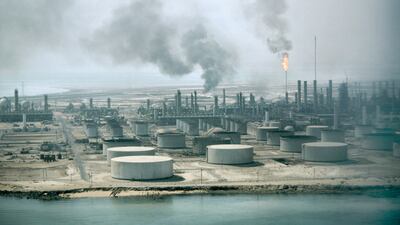Higher oil and gas prices will further support GCC countries' economic growth during the rest of this year and into 2023, bolstering a steady recovery from the Covid-19 pandemic that began in the second half of last year.
Although international energy prices are unlikely to remain at current levels long-term, given that the spike in part reflects uncertainty over oil and gas supplies owing to the Ukraine war, they are likely to stay elevated in 2022, KPMG said in its Global Economic Outlook report.
"The positive impulse provided by the GCC’s oil and gas sector ― through both increased production and prices ― will further support the continuing economic recovery during the remainder of 2022 and into 2023," the global consultancy said.
Oil prices, which rallied 67 per cent in 2021 on robust demand as global economic momentum gathered pace last year, maintained the momentum this year.
Brent, the benchmark for two thirds of the world's oil, rose to a notch under $140 per barrel in mid-March after the US and its allies imposed sanctions on Moscow in response to its military offensive in Ukraine.
Although it has given up some gains, prices remain elevated.
Brent was 2.24 per cent higher trading at $103.4 on Monday at 3.16pm UAE time. West Texas Intermediate, the gauge that tracks US crude, was up 1.89 per cent trading at $99.43.
Private sector activity in the GCC, improving after the easing of Covid-19-related restrictions, will further benefit from elevated international energy prices as they strengthen the bloc's fiscal and balance of payments accounts, KPMG said.
"Improvements in these indicators signal that GCC governments are better-equipped to offset any potential negative economic shocks," the report said.
Business activity in the non-oil private sector economies of Saudi Arabia and the UAE, the two biggest Arab economies, continued to improve in June as output and new orders grew amid rising optimism about future growth despite mounting inflationary pressures.
The headline seasonally adjusted S&P Global Saudi Arabia Purchasing Managers’ Index rose to 57 in June, up from 55.7 in May, the highest reading since October 2021 and slightly above the survey’s long-run average of 56.8.
The World Bank estimates that the kingdom's economy will grow 7 per cent this year, while Jadwa Investment expects the Arab world's largest economy to expand 7.7 per cent in 2022.
Meanwhile, the UAE's economy is set to expand by an annual 5.4 per cent this year, driven by the country’s success in containing the health and economic impact of the pandemic, according to the Central Bank of the UAE.
The International Monetary Fund projects that the UAE economy, the Arab's world's second largest, will grow 4.2 per cent this year, while Emirates NBD forecasts growth of 5.7 per cent and Abu Dhabi Commercial Bank estimates a 6 per cent expansion, supported by a sharp rise in the oil sector.
With robust private sector activity and easing Covid-19 restrictions, growth in GCC countries' oil and non-oil sectors is pointing towards a dip in unemployment rates, according to KPMG.
"On balance, current trends in the domestic and international economies will support robust economic growth in both the GCC’s oil and non-oil economies, with the pick-up in economic activity reducing unemployment rates," the report said.
Annual average inflation is also expected to remain contained during 2022 and 2023, it said.
Inflation risks in the GCC will be cushioned by regional governments' successful supply chain management strategies.
The exchange rate peg against the US dollar will also help contain import inflation given the expected stability of the US currency, while oil revenue will help governments offset the impact of high international commodity prices on domestic inflation, KPMG said.
On the other hand, non-GCC countries in the Middle East are exposed to risks such as weak fiscal and balance of payments positions, volatile and limited economic growth rates and low resiliency towards economic shocks, it said.
Overall, these countries' real gross domestic product growth rates are likely to be constrained during 2022 and 2023, limiting a strengthening of local labour markets, KPMG said.
At the same time, high global commodity prices are expected to continue feeding through into domestic inflation, adding to "economic volatility and uncertainty" across this bloc.


